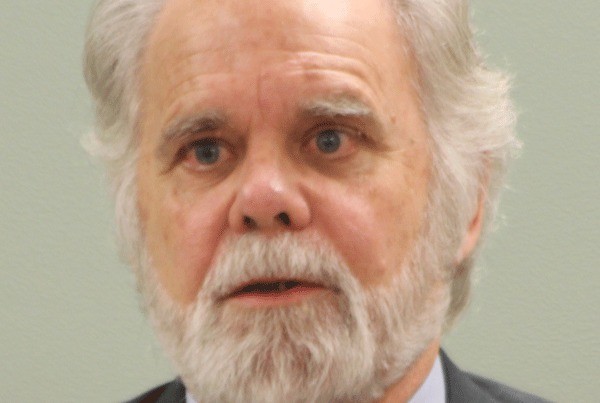Shocking many in the courtroom, Robert “Al” Baker took the stand Thursday afternoon in his own defense and claimed his wife’s death is a mystery to him.
The 62-year-old Antarctic physicist and pizza man is accused of brutally murdering Kathie Baker in the days before his girlfriend came to visit the couple’s Greenbank home last June.
Baker testified that he doesn’t know anything about the murder.
“I swear on everything I hold sacred, my mother’s grave, I did not kill Kathie,” he told the jury. “I did not kill my wife.”
Baker’s testimony was the first time Baker has had a public opportunity to present his side of the story. He said he and his wife worked together at the South Pole and owned a pizzeria in Freeland together.
Liza Schuldt, his former love interest, testified against him Wednesday; she described how he wooed her, told her he had broken up with his wife and invited her to live with him at his Greenbank home.
She read several of the romantic messages Baker wrote on the greeting cards he mailed to her every day for months.
“I’m kind of old fashioned and I thought if this all worked out I was going to put them together and make a collage,” she said of the large collection of cards.
Senior Deputy Prosecutor Eric Ohme meticulously presented the evidence against Baker; he called on deputies, detectives, forensic scientists, people who worked for the Bakers, people who spoke with Baker after the murder and even a security official from State Ferries.
Baker’s attorney, Tom Pacher of Coupeville, had few questions about the blood and other forensic evidence, which showed that Kathie Baker was bludgeoned with a hammer and strangled in their bed before being dragged to the garage, tied in a tarp and thrown in a ravine behind the house.
On the stand, Baker admitted that he was romantically interested in Schuldt, with whom he worked at a science station at the South Pole; his wife also knew Schuldt, but had stopped going to Antarctica years prior.
He flew to Alaska to visit Schuldt twice in the spring of 2012, then bought her a plane ticket to visit him in Greenbank. He said he had told Schuldt he split with his wife and she didn’t live at the house anymore, which wasn’t true.
Baker said he knew his wife was supposed to fly out to Denver to visit her employer, Raytheon Corporation. He said Kathie Baker and her car were gone on the morning of Sunday, June 3, so he assumed she went to Denver.
Later that day, he picked Schuldt up from the airport. He returned home to find that Kathie Baker’s car was in the garage.
“I thought we were going to have a problem, but she wasn’t in the house,” he said.
Baker admitted he lied to deputies when they came looking for Kathie Baker later in the week. Raytheon had alerted the police when they couldn’t reach her. Baker told the police that he had dropped his wife off at the airport and later told them she lived in Colorado.
He said he was caught between two women with two stories.
“I didn’t want the police to tell Kathie that Liza was there,” he said, “and I didn’t want the police to tell Liza that Kathie still lived there.”
“I didn’t want Kathie to know I was pursuing a relationship with Liza,” he said.
He denied making plans to divorce his wife and denied he would have been angry if she threatened to leave him.
“There is nothing that would have made me want to kill my wife,” he said.
Thursday, Schuldt testified at length. The 61-year-old woman, with sections of her hair dyed purple, largely avoided eye contact with Baker as she read through romantic emails and cards that he had sent her after they returned from Antarctica in February of 2012.
She said her relationship started out as platonic, but Baker quickly made his romantic intentions clear.
“To be blunt, I’ve had a smoldering interest in you for some time,” he wrote an one email.
She described her growing unease while visiting Baker.
First there was a large carpet stain she tried to clean up, then a police car in the front yard, questions from deputies about Baker’s missing wife and his vague answers.
Lt. Evan Tingstad with the Island County Sheriff’s Office testified about the search for Kathie Baker. He and a deputy became suspicious almost immediately.
“We were very concerned about the contact,” he said, referring to talking to Baker. “There was something there that was missing. There was something wrong.”
Tingstad grilled Baker repeatedly when he felt his answers didn’t make sense. He asked Baker if he tried to contact his wife after learning that she was missing.
“I said, ‘Of course you haven’t because you know she wouldn’t answer,’” Tingstad testified he told Baker.
Ohme also called several forensic scientists to the stand.
Kathy Geil, a firearm and tool mark specialist from the Washington State Patrol, testified about analyzing a bloody hammer found in the garbage at the Bakers’ home. She said it could have been a possible source Kathie Baker’s head injuries. Another scientist reported finding Kathie Baker’s DNA on the “flat side” of the ball peen hammer.
Ohme rested his case Friday morning. Pacher waived his opening statement, which he had reserved at the start of the trial, then called Baker to the stand.
Baker was scheduled to be cross examined Friday afternoon. Judge Alan Hancock said he expects closing arguments Monday morning and then the case will go to the jury.



